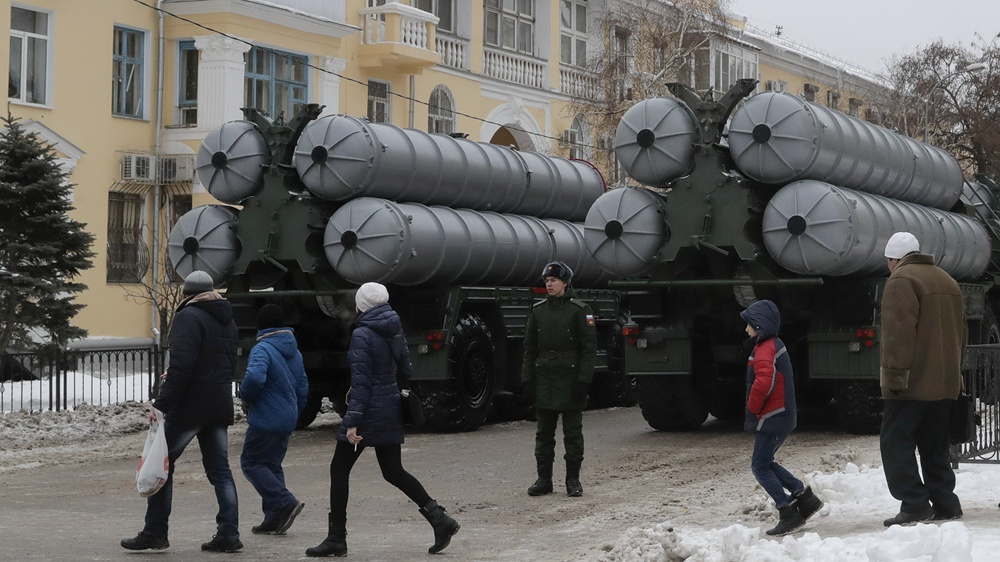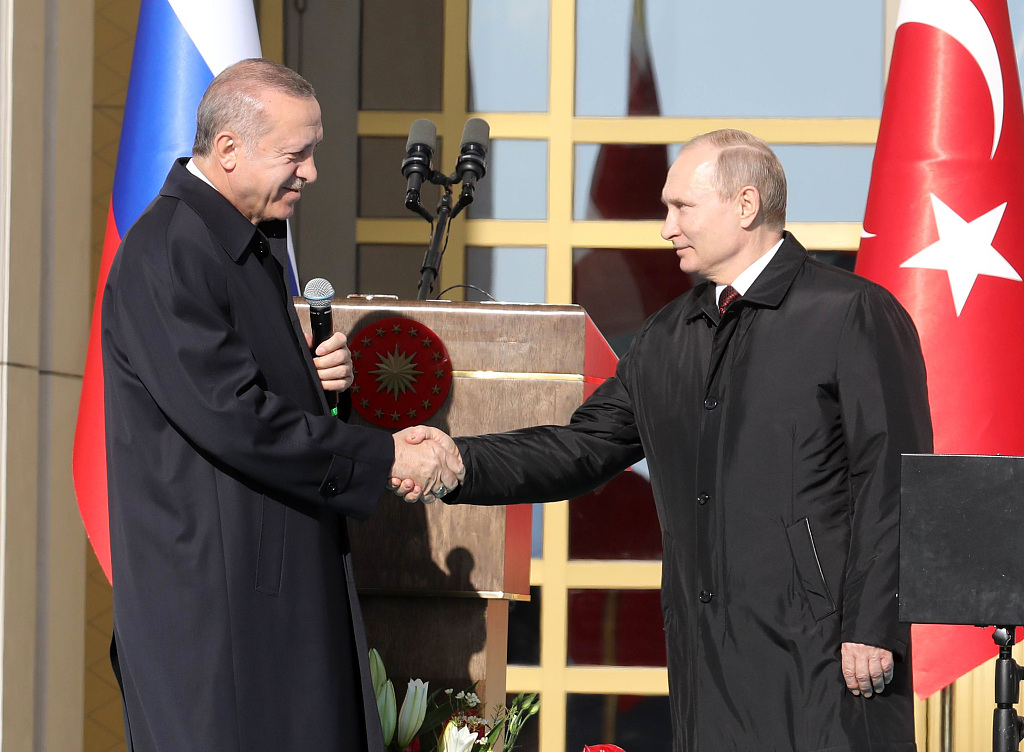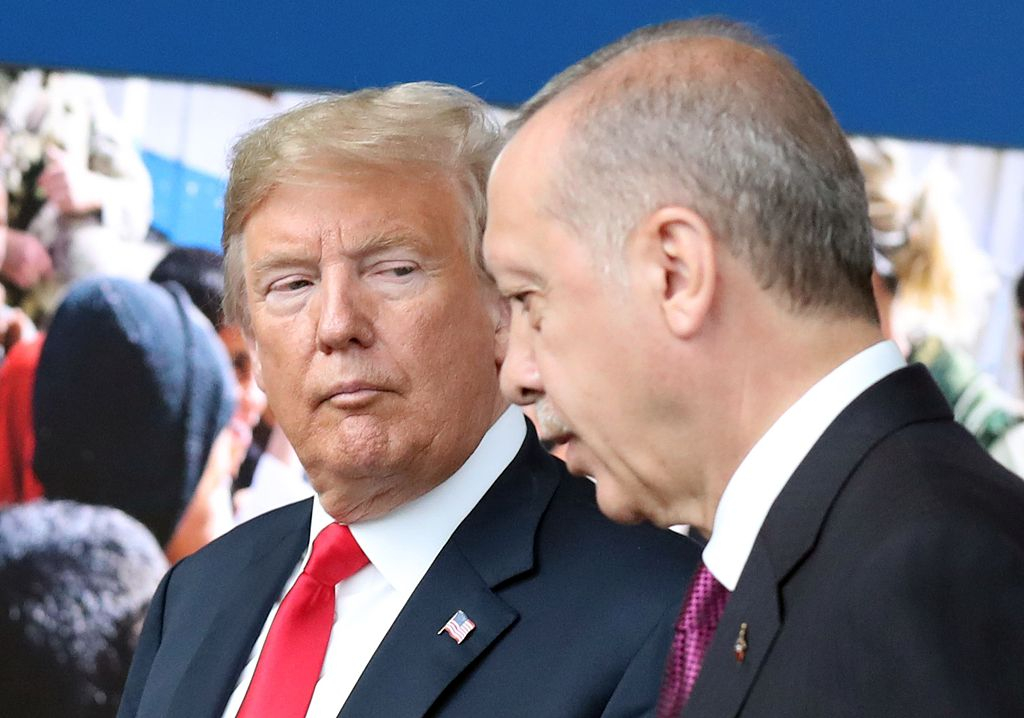
World
18:45, 31-May-2019
Turkey says no delays in delivery of S-400s from Russia
CGTN

The delivery schedule for Russia's S-400 missile defense systems to Turkey is continuing as planned, Turkish Foreign Ministry spokesperson Hami Aksoy said on Friday, dismissing reports of delay.
The U.S. and Turkey have been at odds over Ankara's decision to purchase the S-400s, which Washington says are not compatible with NATO systems and pose a threat to the F-35 stealth fighter jets. Ankara has proposed to form a working group to assess the U.S. concerns, but has not received a response yet.
On Monday, broadcaster Haberturk quoted Turkish Defense Minister Hulusi Akar as saying that the delivery of the S-400s may not happen in June, when Turkey previously said the missiles were due to arrive, but added the agreement was a done deal.
Read more:

Turkish President Recep Tayyip Erdogan (L) and Russian President Vladimir Putin shake hands during a ceremony launching the construction of Turkey's first nuclear power plant, April 3, 2018. /VCG Photo
Turkish President Recep Tayyip Erdogan (L) and Russian President Vladimir Putin shake hands during a ceremony launching the construction of Turkey's first nuclear power plant, April 3, 2018. /VCG Photo
"Reports in some media outlets about Turkey evaluating delaying the S-400 procurement upon the request of the United States do not reflect the truth," Aksoy said in a statement, adding that Ankara's offer for a joint working group with Washington was still valid.
Threat of U.S. sanctions
Turkey is on the cusp of facing U.S. sanctions over its decision to buy the S-400, leaving its already soft currency and economy vulnerable and raising questions over its position within NATO and the region.
If no solution is found in coming weeks and U.S.-Turkish tensions continue to worsen, tit-for-tat sanctions could hit trade between the allies and prolong a recession in Turkey.
Turkey also risks being rapidly cut out of the production and use of American F-35 fighter jets, which could mark a step toward a re-evaluation of its 67-year membership in the North Atlantic Treaty Organization.

U.S. President Donald Trump (L) talks to Turkish President Recep Tayyip Erdogan as they arrive for the NATO summit in Brussels, July 11, 2018. /VCG Photo
U.S. President Donald Trump (L) talks to Turkish President Recep Tayyip Erdogan as they arrive for the NATO summit in Brussels, July 11, 2018. /VCG Photo
"It's very complex to resolve because both U.S. and Turkish officials see this as a reflection of a larger geo-political balancing," said Galip Dalay, visiting scholar at the University of Oxford's politics and international relations department.
"Sanctions would have a very consequential effect on Turkey, but probably not mark a breaking point in its U.S. relationship," he said.
Washington and Ankara have repeated a desire to avoid so-called CAATSA sanctions, which by U.S. law would be triggered when the Russian anti-aircraft weapon arrives on Turkish soil.
U.S. President Donald Trump and Turkish President Recep Tayyip Erdogan agreed on Wednesday to meet on the sidelines of a G20 summit in Japan's Osaka on June 28-29. Will Trump be able to convince Erdogan to turn his back on what the Turkish leader has repeatedly called a "done deal" with Russia?
(Cover: People walk past Russian S-400 missile air defense systems before the military parade to commemorate the 75th anniversary of the battle of Stalingrad in World War Two, in Volgograd, Russia, February 2, 2018. /Reuters Photo)
6842km
Source(s): Reuters

SITEMAP
Copyright © 2018 CGTN. Beijing ICP prepared NO.16065310-3
Copyright © 2018 CGTN. Beijing ICP prepared NO.16065310-3